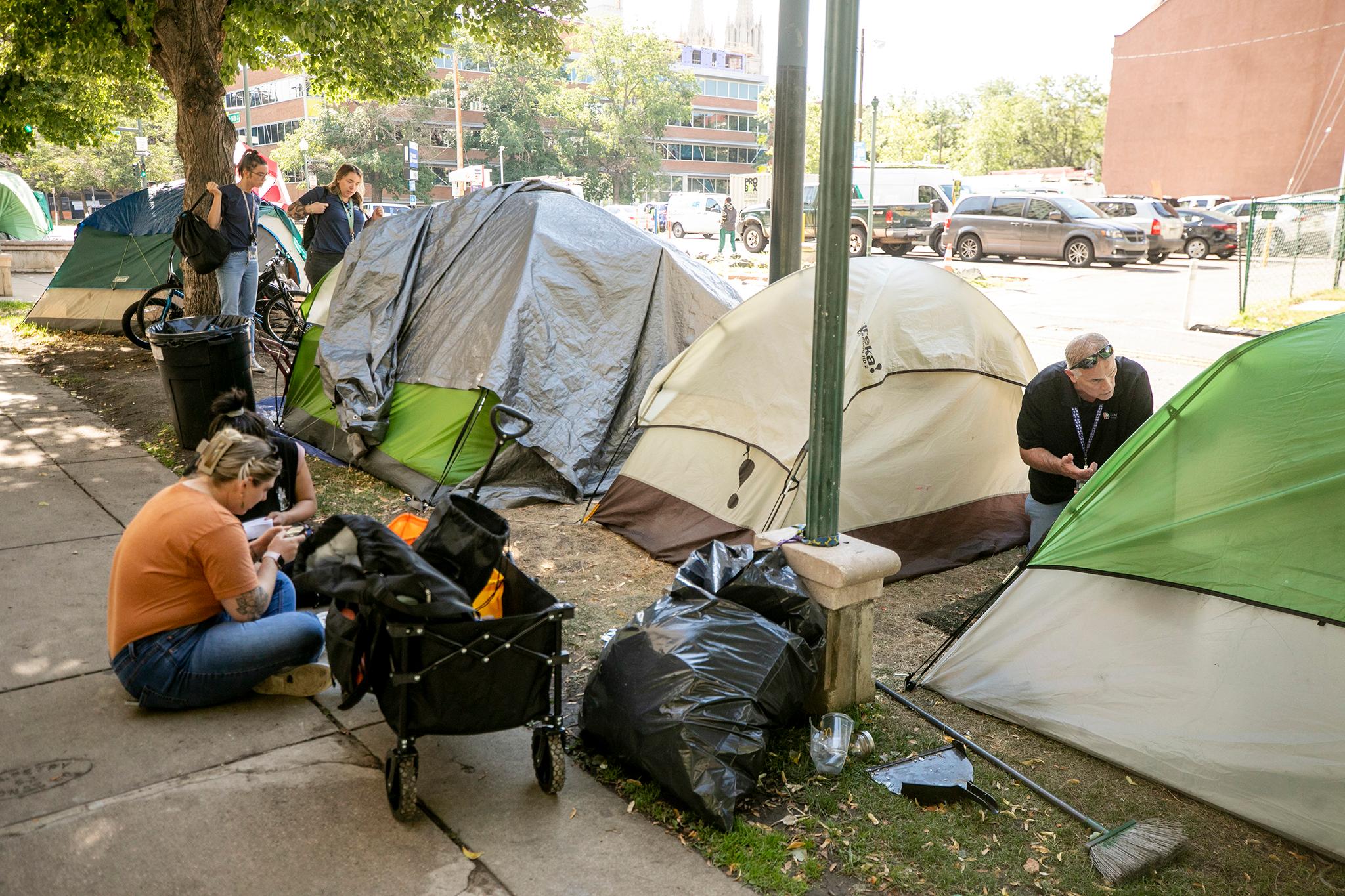A plan to provide funding for outreach to Denver residents living in encampments and help them move into non-congregate shelters, bridge housing or supporting housing cleared its first hurdle in City Council on Wednesday.
The $6,400,000 proposed contract would go toward starting one leg of the city's encampment response, dubbed Encampment Resolution Outreach. It's a part of Mayor Mike Johnston's goal of housing at least 1,000 people by the end of this year.
The proposed funding agreement is between the Department of Housing Stability and the Colorado Coalition for the Homeless, but the funding itself would be given to the Coalition for the Homeless, which will perform the outreach. The St. Francis Center and Urban Peak will be subcontractors. The Coalition will hire 21 additional staff, including a nurse, outreach workers, behavioral health navigators, case managers and housing navigators.
While the agreement was accepted by some members of the Safety, Housing, Education and Homelessness Committee as an important step forward, other members were left with questions and feelings of unease.

Through the agreement, the outreach team will be responsible for providing supportive services to those living in encampments. Those services include move-in assistance, making sure clients have all the necessary paperwork and documentation, landlord recruitment, connecting clients with behavioral and physical health services, enrolling clients into different programs such as subsidized housing or rent assistance. The purpose of the wide-range of services is to make transitioning into housing as simple as possible.
The Coalition's target, in collaboration with the city, will be to ultimately move 1,080 people from encampments into housing, with a minimum goal of 90 people per quarter.
Some councilmembers are concerned about duplicative services
Councilmember Amanda Sawyer pointed out that the services being proposed through this agreement are already provided by several organizations throughout the city, such as the Early Intervention Team and the Denver Street Outreach Collaborative and Strategic Outreach to Large Encampments programs, both of which are partially run by the Coalition for the Homeless.
"We have already dumped significant amounts of money into this exact same thing," Sawyer said. "Why are we not utilizing the resources we already have and the structures we already have in place instead of adding new money to a new contract to do this...Why are we continuing to have this fragmented silo system where we have multiple agencies and multiple teams doing multiple things for the same purpose?"
She noted that the contract may be "the right way to go about" addressing encampments, but having the other programs along with this proposed contract doesn't make financial sense.

Cole Chandler, Mayor Mike Johnston's senior advisor for homelessness resolution, slightly agreed with Sawyer.
He said that homelessness resolution team is looking into the various programs that address outreach and assistance measures, but he noted that this specific program is different from the others.
"The reality of this particular contract is that it is focused on encampment resolution and leveraging available resources around an encampment to surround the folks there and help them move into housing," Chandler said. "That is not a way that we've approached encampments in the past."
Using this approach brings a heightened focus to closing the encampments and allows the team to determine whether the other programs have been effective and efficient, he added.
"This could become the central piece in the way we engage encampments moving forward into the long term and then there's a chance to reorient around that," Chandler said. "This approach of going encampment by encampment and being able to surround those encampments and ultimately resolve them is something that we need to bring forward at this time."
Other councilmembers raised concerns about staff hiring and effects on businesses
Councilmember Shontel Lewis questioned the Coalition's current workload and Councilmember Sarah Parady questioned how much of the proposed funding would go toward staff salaries.
There were several other concerns that didn't necessarily pertain to the proposed contract. Sawyer and Councilmember Darrell Watson noted that many local businesses in their districts have said they're suffering financially because of encampments. Both mentioned the urgency expressed by business owners in having the encampments removed quickly so customers feel safer and have easy access to their establishments.

Sawyer wondered if funding could be diverted to business owners experiencing hardships because of encampments in the same the way the city provides financial assistance to businesses during periods of construction. Chandler said that funding is something the task force would look into.
At the end, the proposal passed through committee with Sawyer and Watson voting "no." The proposal will make its way to full council in the upcoming weeks.
The committee also approved a grant to fund more housing

Meanwhile with a unanimous "yes" vote, the committee also passed a grant agreement between HOST and the Denver Housing Authority.
The grant for $15,700,000 would go toward repaying a bridge loan DHA received to purchase the Best Western Central Park at 4595 Quebec Street. The funding will come from the American Rescue Plan Act.
The hotel will eventually be converted into permanent supportive housing, but for the next three years, it will act as a non-congregate shelter run by the Salvation Army.
When the building is converted into permanent supportive housing, at least 40% of the units will be dedicated to tenants who make 30% of the area median income, or less than $24,650 for an individual and $35,150 for a family of four.
This proposal will also head to full council in the upcoming weeks.













